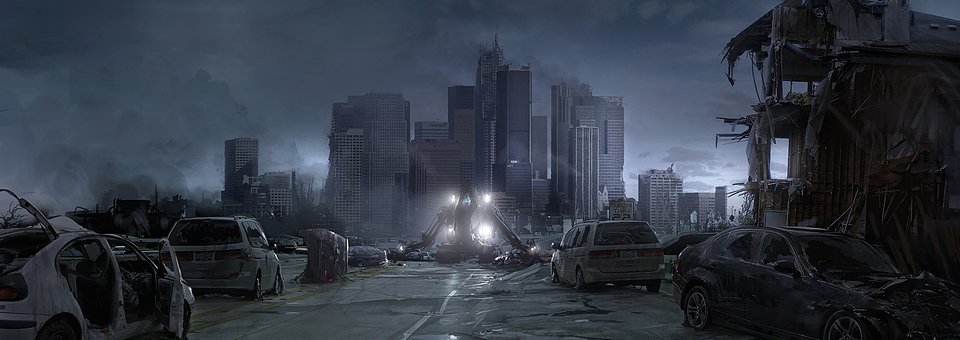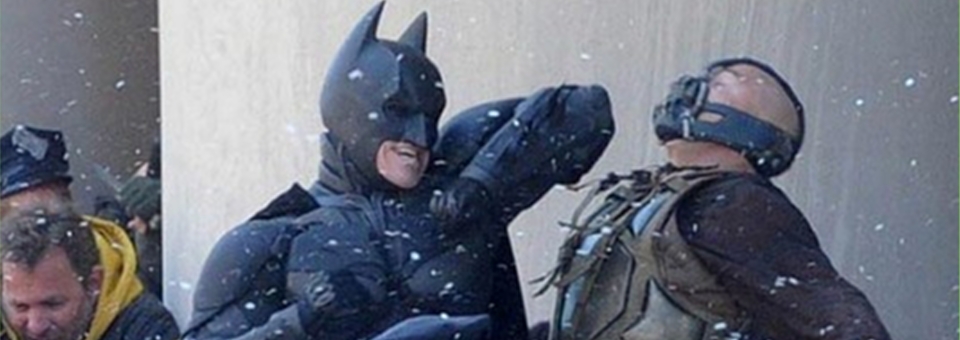We have made quick transitions between trends in the 21st century, from savior fantasy in Harry Potter and Lord of the Rings (if you don’t think this was a trend I point you to Reign of Fire) to anything vampire (from melodramatic Twilight to melodramatic True Blood to melodramatic Abraham Lincoln: Vampire Hunter…I’m sensing a trend here) and the gritty real worldization of what would normally be impossible (thank you Chris Nolan). The newest trend, however, revolves around a world in ruin and survival in a post-apocalyptic landscape.
Despite the relatively transitional ease from making all things ultra-real, now with 30% more dirt and 500% more explanation, to post-apocalypse the reason why this trend has become so popular is interesting. Why has the popularity risen so intensely over the past few years to where one of the most popular shows on all of TV is The Walking Dead, a show about running away from and killing zombies? Or why the the most popular new show is about living in a world without electricity (how I loathe you Revolution)? What does this say about our society as a whole and perhaps the agenda being pushed forth by Hollywood?
As a nation we are reaching a boiling point. The level of dissatisfaction in our leaders and government seems to be higher than ever while the level of cooperation within the government seems to be at an all time low. It takes more work and more money to maintain a relatively healthy lifestyle and the gap between rich and poor is ever widening. Meanwhile, the natural world continues to hurtle towards ruin, especially as the two most populous countries begin to industrialize. And the western world is constantly on watch for the next terrorist attack. On a personal level people are losing, have lost, or cannot get jobs and are forced to take on jobs they are overqualified for and receive lesser pay doing them. Entry-level positions at many companies require even more costly education. It is harder for people to make ends meet than ever.
Having said all this, it makes the question of why people have become so interested in this even more intriguing. If TV, movies, books, and video games are supposed to be a form of escapism, why do most people want to escape to a world in ruin? Post-apocalyptic plots offer two separate themes, survival and destruction. It is these very themes that people have chosen to escape to and seek solace.
Even though the struggle to survive in these worlds, especially in worlds infested with zombies or nuclear radiation (think Dredd or any entry into the Fallout video game franchise), it seems mentally and emotionally simple. Our lives have changed drastically recently with the constant linking with friends and families and the inability to have private moments that could become fodder for Youtube or Facebook. In the post-apocalypse he complications of modern life completely blow away because the only thing that matters is finding a safe place to live. Kill that zombie or you’re dead. Grow enough food or you’re dead. Find shelter and a place to settle or you’re dead. While a post-apocalyptic world doesn’t bring everyone back to equal footing, it does create more equality. (Unless for some reason you simply allow a certain militia, who doesn’t seem to help its citizens in any way, to control you without putting up a fight, Revolution, ahem.) It is a world based on merit and not whom you know or how much money you have. If you are capable of surviving then you do, if not then you die.
The utter destruction and ruin of post-apocalyptic worlds is also important. Seeing Atlanta overrun by zombies or the streets of Chicago overgrown and smattered with open-air markets gives the audience two aspects of pleasure. The first, and probably more disturbing, is the fulfillment of destruction lust. Seeing these images fulfill the audience’s desire to see the more fortunate punished for their luck in life, to see everyone equal, and to begin anew. The second aspect of pleasure is derived from a sense of gratitude for what they currently have. No matter how disappointing one’s life can get or how upset someone gets at the lack of the government acting for the people (which is basically what they are supposed to be doing), taking a trip into these post-apocalyptic worlds becomes a constant reminder that things could be a lot worse. Sure, my checking account is running low but thank goodness I don’t have to settle in an abandoned prison for safety. While these worlds can offer up a sense of gratitude for what one has it also might be negatively affecting change as a whole.
While civil unrest is never wanted, it is usually the only way to make grand and sweeping changes across the populous. Post-apocalyptic works that offer dire futures much worse than the present may help quell some of that unrest. The pacification that can come from being grateful for what one has could ultimately be a detriment to society. Instead of wanting to create and enact change in the world a person that is a fan may ultimately decide that there’s no point in fighting for change because things aren’t nearly as bad as they could be. The inverse of this notion could factor in their mindset as well, but since most post-apocalyptic tales revolve around zombies or disease, something that cannot be controlled by humans, it won’t be as effective as say a piece about an America in ruin due to unemployment or an Earth ravaged by global warming.
But a trend is just a trend after all and by definition is not permanent. While it is odd that the post-apocalyptic trend is reaching its pinnacle at the moment of the most civil unrest since the 1960s it isn’t surprising. As stated previously, people turn to entertainment for escape. As America seems to be on the decline people don’t want a constant bludgeoning of the slow descent but would rather have a reminder of just how good they have it, even if it is a little worse than what they had five years ago. If the trend could last through a true and substantial rebound that is when things could be real interesting but as for now enjoy the comfort that is received from post-apocalypse.









So appropriate for today. People do seem to be intrigued by this notion of an apocalypse thanks to these types of TV shows and everything. It is almost like they are romanticized-yet not at all. People dying by zombie and vampire every day certainly would not translate well from TV screen to real life-terrifying!